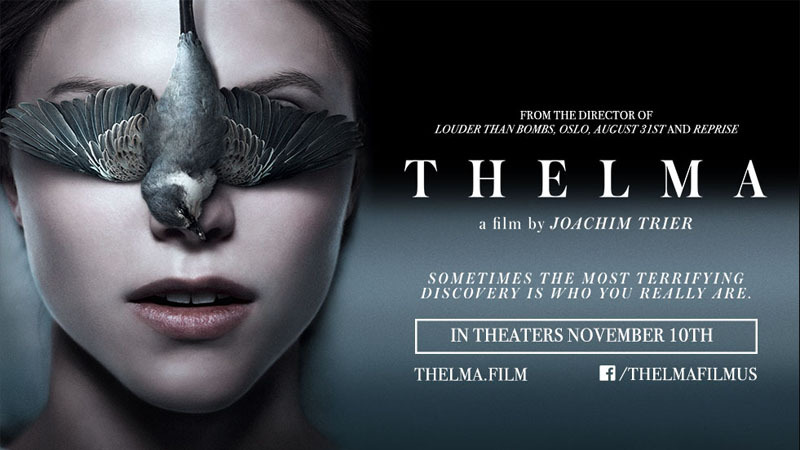Thelma is directed by Joachim Trier, and stars Eili Harboe. The film is in the Norwegian language, and subtitled in English for American theatrical exhibitions.
Thelma is a girl who has begun attending college in Oslo, and quickly finds herself at odds with her family’s by-the-book Christian upbringing. When she begins to get out more and socialize, she finds herself falling for a beautiful classmate, but also discovers herself suffering from strange seizures, which are accompanied by unnatural phenomena. What is the cause of Thelma’s strange condition, and will she be able to move on, and live a new life with the young woman she has fallen for?
Thelma is a film that has a few absolutely polarizing and shocking moments, and a great performance from the beautiful and convincing Eili Harboe. But the film finds itself at odds with what kind of movie it wants to be. Were the filmmakers trying to create a film about Thelma’s first alternative romance and coming of age away from her parents, or a supernatural horror thriller? Thelma does plenty of things well, but its disjointed nature and identity crisis prevent it from ascending to greatness.
As far as the positives go, there is no denying what Eili Harboe brings to this role. She is a beautiful young actress, and absolutely convincing in every single scene the film has to offer. Whether she is living her day-to-day life, away from home at college, becoming enamored with a gorgeous classmate, or finding herself in fear from the mysterious seizures and goings on in her life, she is by far the best thing that this film has to offer.
The striking visuals and surreal events leave an impact on the viewer. We see Thelma having seizures, and the environments around her impacted as such. There are “visions” of sorts, including beautifully shot lovemaking between Thelma and her partner. And, of course, moments where Thelma struggles to comes to terms with it, and encounters further unexpected obstacles and complications, and the strange and mysterious circumstances of her and her family’s past.
Sadly, the film never quite lives up to its potential. Sluggish pacing (the film clocks in at roughly two hours) and inconsistent tone work against it. The intro sequence with a young Thelma and her father in a wooded landscape feels more like it is setting up The Revenant than this film. And, the first hour or so of the movie only has brief moments of the more supernatural goings on, and seems to be aiming for a more erotic, coming-of-age story. But come the midway point, the tone changes drastically, and the movie, essentially, turns into a Carrie rip-off.
Two other awkward distractions are a frustrating amount of Apple MacBook and iPhone product placement, and scenes in medical centers with heavy, pulsating flashing lights. This may be the only movie I have ever seen with a “seizure risk” disclaimer coming before the main film, and the sequences in which this is true are quite nauseating and intense. Furthermore, the film wastes too much time with these medical center sequences.
Thelma had potential, but ultimately it ends up feeling like a foreign language, lesbian version of Carrie, which is less spellbinding and effective. Pacing issues and tonal inconsistencies keep the film from reaching a level of greatness, and yet, the film is not a total loss, with positive attributes like striking and surreal visuals, and its love story. Eili Harboe stands as a positive light in a hit-and-miss film, and gives this movie some superb moments. I cannot recommend rushing to the theater to see Thelma, but it will make for decent weekend rental material on its home release.
Rating: Two out of four stars.
DISCLAIMER: All image in this review are the property of their respective copyright holders. For promotional use only. All rights reserved.

